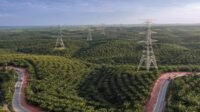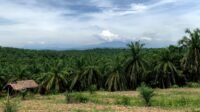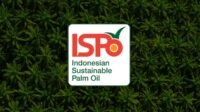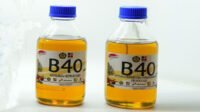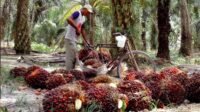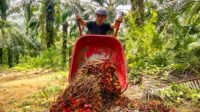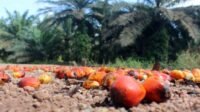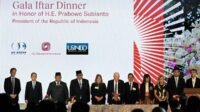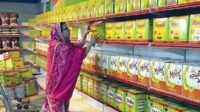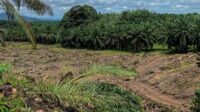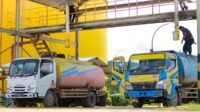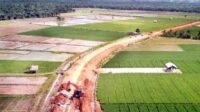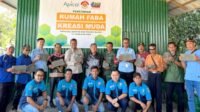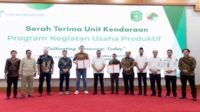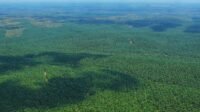PALMOILMAGAZINE, SINTANG – The Sintang Regency Government has reaffirmed its commitment to becoming a national pioneer in sustainable palm oil development. Through the formulation of Phase 2 of the Regional Action Plan for Sustainable Palm Oil (RAD KSB) for 2025–2029, Sintang is entering a new chapter in establishing inclusive, transparent, and environmentally responsible palm oil governance.
The draft strategic document was developed through an extensive, participatory process involving national and regional government institutions, the private sector, smallholders, academics, and civil society organizations. The finalization workshop held at the Directorate of Palm Oil and Various Palma Crops, Ministry of Agriculture, marked a crucial moment to ensure that Sintang’s palm oil development aligns with national sustainability principles.
Arif Setya Budi, Head of the Secretariat of TPD-KSB Sintang Regency, emphasized that Phase 2 of RAD KSB reflects the region’s vision of creating “a progressive, prosperous, high-quality, and sustainable Sintang.” He noted that the document not only outlines strategic plans but also lays out concrete implementation steps that promote equitable economic growth, enhance the competitiveness of local products, and protect the environment as key foundations of a green economy.
Also Read:
Five Strategic Pillars of Sustainable Palm Oil Development
RAD KSB Phase 2 is structured around five integrated strategic pillars:
- Data and Coordination
Strengthening the data foundation through smallholder mapping, issuing STDB farm registrations, and updating company data and high conservation value (HCV) areas. - Smallholder Capacity Building
Expanding training programs, strengthening smallholder organizations, and promoting the use of certified seeds to boost productivity. - Governance and Environment
Improving land conflict resolution, preventing forest and land fires, and supporting the implementation of traceability systems for fresh fruit bunches (FFB). - Downstream Development and Value Addition
Encouraging business diversification and broader utilization of palm oil derivative products to generate greater community-level economic benefits. - Certification and Market Access
Accelerating ISPO certification for farmers and building a data-driven traceability system to expand access to global markets.
These pillars are aligned with the National Action Plan for Sustainable Palm Oil (RAN KSB) and the Sintang Regional Medium-Term Development Plan (RPJMD), supported by cross-agency coordination to ensure integrated execution.
Also Read:
Support from Development Partners
Sintang’s efforts to strengthen sustainable palm oil governance have gained recognition from multiple stakeholders. Among them is Rainforest Alliance, which considers Sintang a model for effective jurisdictional approaches.
Tri Padukan Purba, Team Manager for Palm Oil at Rainforest Alliance, highlighted that multi-stakeholder collaboration is essential to achieving sustainable palm oil development. “This action plan enhances governance, improves farmer productivity, protects ecosystems, and increases supply chain transparency. Collaboration among all actors is the foundation of a responsible palm oil production system,” he said in an official statement received by Palmoilmagazine.com on Thursday (13/11/2025). He also encouraged the immediate finalization of the document and its formal adoption through a Regent Regulation.
Inputs for Document Improvement
The Secretariat Team of the National Action Plan (RAN KSB) provided constructive feedback to sharpen and increase the practicality of the draft Phase 2 RAD KSB. Key recommendations included:
- Alignment with the forthcoming Presidential Regulation on RAN KSB Phase 2 (2025)
- Clearly defined and measurable programs, including mechanisms, schedules, and responsible agencies
- Annual quantitative targets to strengthen progress evaluation
- A monitoring and evaluation system with clear performance indicators
- Innovative funding mechanisms utilizing corporate CSR funds and other green financing schemes
Collective Commitment to a Greener Palm Oil Future
Kurniawan, S.Sos., M.Si., Head of the Sintang Development Planning Agency (Bappeda), stressed that RAD KSB Phase 2 is not merely an administrative document but a practical roadmap for all palm oil stakeholders in Sintang to move in unison toward fair and sustainable practices.
Meanwhile, Martin Nandung, Head of the Sintang Agriculture and Plantation Office, highlighted the importance of national regulatory support, particularly the upcoming Presidential Regulation on RAN KSB Phase 2 and its technical guidelines in 2025. “These documents are essential to ensuring that national and regional policies move in harmony,” he said.
Through cross-sector collaboration and shared commitment, Sintang is charting a steady path toward a sustainable palm oil future—where farmer prosperity and environmental protection go hand in hand. (P2)



